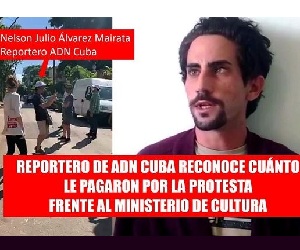 This past December, the Ministry of Culture issued a statement entitled “Those who asked for dialogue disrupt the dialogue.” The document was drafted after Fernando Rojas, Deputy Minister of Culture, received via e-mail an “unacceptable” message from several of the persons with whom he had met on November 27, when, on a very meaningful date for Cubans, a group of artists gathered in front of the Ministry’s headquarters to demand a dialogue. Some of the individuals present came in response to a call posted on social networks by persons who had no interest whatsoever in discussing cultural issues.
This past December, the Ministry of Culture issued a statement entitled “Those who asked for dialogue disrupt the dialogue.” The document was drafted after Fernando Rojas, Deputy Minister of Culture, received via e-mail an “unacceptable” message from several of the persons with whom he had met on November 27, when, on a very meaningful date for Cubans, a group of artists gathered in front of the Ministry’s headquarters to demand a dialogue. Some of the individuals present came in response to a call posted on social networks by persons who had no interest whatsoever in discussing cultural issues.
The aforementioned statement from the Ministry reaffirmed that the institution would not agree to meet “with persons who have direct contact with and receive financing, logistical support and propaganda support from the U.S. government,” nor “with news media financed by U.S. federal agencies.”
In November, members of the misnamed San Isidro Movement refused to recognize authorities and assumed a threatening posture to attain their demands by force. Many of those who arrived at the Ministry came with the intention of participating in a peaceful demonstration; others, however, had previously received instructions to raise a wide range of concerns, ideas and demands. Citizens involved in acts of vandalism against MLC stores on the island also participated.
January 27, shortly before an online March of the Torches took place on social networks to commemorate the 168th anniversary of the birth of José Martí, the Ministry once again reiterated its principles, in response to another counterrevolutionary provocation, and reaffirmed its willingness to dialogue without conditions or coercion.
The Ministry repeated on Twitter “its willingness to dialogue with honest creators on any issue related to the Cuban Revolution’s cultural policy and reiterates its refusal to accept provocations or dialogue with mercenaries.”
This message was included in a statement from the institution, entitled “They don’t want dialogue and stage provocations to the limit,” which was issued in connection with an incident that occurred the previous morning, when a meeting was scheduled with three spokespeople chosen by a small group of individuals characterized by their provocative attitudes and relationships with media financed by U.S. federal agencies.
Ignoring the agreed-upon plan, some thirty persons congregated in front of the Ministry’s headquarters. They were asked to participate in dialogue or leave, given the health risks involved in such gatherings in public spaces, during the covid-19 epidemic.
Faced with their refusal to cooperate, the Ministry’s workers reacted immediately, gathering in front of the provocateurs and urging them to leave.
Alpidio Alonso, Minister of Culture, said on the occasion: “They do not want any dialogue whatsoever. They were invited to enter several times, but did not care to do so. And we are not going to allow this at the Ministry of Culture. We are working too hard here for them to come here with this kind of provocation. They disrespect the country’s entire artistic movement which is revolutionary…. If they come in a defiant, provocative tone like this, they are going to receive an energetic response from our people.”
Media expert Javier Gómez Sánchez has addressed events such as these, noting that the first thing to make clear in the present situation is “that the first and principal aggression, the principal act of violence, was to surround an institution and create a state of siege for the people who work inside.”
Another behavior repeatedly assumed by the counterrevolution is “to refuse any understanding, to use cell phones and social networks to mobilize more people, to manipulate the media, and do so while receiving money from the country that sustains a cruel economic, financial and commercial blockade against ours, in order to create the worst possible environment, to provoke as much as possible, until they achieve a reaction they can use to their advantage.”
Gomez Sanchez urges all revolutionaries to think clearly about the objectives of the counterrevolutionaries, who seek to obscure the principal act of violence, and attempt to trigger a judgmental response in us, questioning the revolutionaries besieged by provocateurs, instead of supporting them.
Simply noting who were among the first to express “solidarity” with the disruptors is revealing, indicative of the intentions of the “peaceful, patriotic artists disposed to dialogue” who are besieging state institutions. Shortly after the provocation, the U.S. Embassy tweeted its concern for the “demonstrators,” and presumed to advise the Cuban government to listen to those who are paid with the dollars allocated in Washington to finance subversion in Cuba, by the millions.
(Taken from Granma)